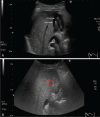Ectopic relapse of IgG4-related disease presenting as IgG4-related sclerosing cholecystitis: A case report and review of literature
- PMID: 30593191
- PMCID: PMC6314772
- DOI: 10.1097/MD.0000000000013868
Ectopic relapse of IgG4-related disease presenting as IgG4-related sclerosing cholecystitis: A case report and review of literature
Abstract
Rationale: Immunoglobulin (Ig) G4-related disease (IgG4-RD) is a chronic inflammatory disorder characterized by high levels of serum IgG4, swollen organs with fibrosis and abundant infiltration of IgG4-positive plasmacytes.
Patient concerns: An 82-year-old male visited our hospital for an evaluation of a pancreatic enlargement and a bilateral submandibular adenopathy. Further investigation revealed elevation of serum IgG4 and bilateral lacrimal submandibular adenopathy. We diagnosed him with IgG4-related disease (IgG4-RD) and started administration of corticosteroid (CS) therapy. Both pancreatic enlargement and adenopathy rapidly improved; however, there was a new occurrence of diffuse wall thickening of the gallbladder during CS treatment.
Diagnosis: Radiological examination revealed diffuse wall thickening of the gallbladder, and its inner layer was smooth and homogenous. These findings suggested an inflammatory change, but the possibility of malignancy could not be excluded.
Interventions: The patient underwent laparoscopic cholecystectomy for a pathological diagnosis.
Outcomes: Histological examination revealed a transmural infiltration of IgG4 positive plasma cells and dense fibrosis. The patient was pathologically diagnosed with IgG4 related cholecystitis presenting as an ectopic relapse.
Lessons: There are 2 major types of IgG4-related cholecystitis, a diffuse wall thickening type and a mass formation type. It is sometimes difficult to differentiate IgG4-related cholecystitis with gallbladder cancer.Corticosteroid (CS) is effective for induction of remission; however, we sometimes encounter disease relapse after reduction of CS dose. We should be mindful that some patients may relapse with new organ involvements even if the primary site and serum IgG4 level are well controlled.
Conflict of interest statement
Competing interests: No competing interests.
The authors have no conflicts of interest to disclose.
Figures




References
-
- Takahashi H, Yamamoto M, Suzuki C, et al. The birthday of a new syndrome: IgG4-related diseases constitute a clinical entity. Autoimmun Rev 2010;9:591–4. - PubMed
-
- Takahashi H, Yamamoto M, Tabeya T, et al. The immunobiology and clinical characteristics of IgG4 related diseases. J Autoimmun 2012;39:93–6. - PubMed
-
- Umehara H, Okazaki K, Masaki Y, et al. Comprehensive diagnostic criteria for IgG4-related disease (IgG4-RD), 2011. Mod Rheumatol 2012;22:21–30. - PubMed
-
- Sah RP, Chari ST, Pannala R, et al. Differences in clinical profile and relapse rate of type 1 versus type 2 autoimmune pancreatitis. Gastroenterology 2010;139:140–8. quiz e112-143. - PubMed
Publication types
MeSH terms
Substances
LinkOut - more resources
Full Text Sources
Miscellaneous

